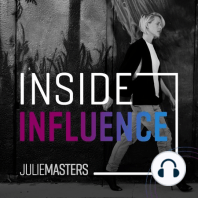49 min listen

Paul Zak - The Trust Factor: The neuroscience of morality, prosperity and epic storytelling
FromInside Influence
Paul Zak - The Trust Factor: The neuroscience of morality, prosperity and epic storytelling
FromInside Influence
ratings:
Length:
72 minutes
Released:
Apr 8, 2021
Format:
Podcast episode
Description
Here’s a question for today – what makes someone trustworthy? What do you look for? If you had to pin it down to a single trait, or indicator, what would it be?Think about how many people we trust in our lives just for a second – with our vision, our businesses, our children, our finances, the health and wealth of our Nation.Yet how do we ever really know if someone can be trusted - essentially their moral code – until it’s tested. Essentially until – potentially – it’s too late. Which brings me on to my next question, and ultimately the focus of today’s episode. Is there a reliable i.e. scientific way that we can predict and therefore design for trustworthy behaviour? A way of being able to trust who we can trust in a way.Now let’s take that to the next level, if there is. If there are repeatable factors behind trustworthy behaviour – how could we use it to influence ourselves? Our own likelihood of behaving in a way that fits with our intentions – with the vision of the human being we want to be on our best days. When I first started diving into this topic, the marriage of combining science with trust seemed like an unlikely one. Human beings are mysteries right? We’re a walking soup of contradictions, hormones and reactions. Any attempt to predict our behaviour usually fails.And yet – this simple force – trust – is the glue that holds together every single fundamental part of the world that we know. Society, democracy, marriage – they all rely totally upon its existence.So, it would seem about time that we dived a little deeper into the mechanics of it.My guest on today’s episode has done exactly that, but he’s also taken it a step further. He’s identified the actual molecule responsible for trust – and found a way it can be used to predict behaviour with up to 80% accuracy.Paul Zak is the founding Director of the Center for Neuroeconomics Studies and Professor of Economics, Psychology and Management at Claremont Graduate University. Paul’s two decades of research have taken him from the Pentagon to Fortune 50 boardrooms to the rain forest of Papua New Guinea. All this in a quest to understand the neuroscience of human connection, human happiness, and effective teamwork. His latest book, Trust Factor: The Science of Creating High Performance Companies, uses neuroscience to measure and manage organizational cultures to accelerate business outcomes. His 2012 book, The Moral Molecule: The Source of Love and Prosperity, recounted his unlikely discovery of the exact neurochemical that drives trust, love, and human morality. In todays episode we dive into…Why human beings are the only creatures with a fully developed moral code – and how we use it to predict behaviour and essentially keep ourselves safe.The moral molecule – what it is, how it works and how it can be harnessed to increase the likelihood of trustworthy behaviour.The link between trust and prosperity – and why understanding the science of trust might be the key to alleviating poverty How Pauls career and experience in this field has impacted his own approach to building trust – as both a leader and a parentAnd finally – probably the part that blew me away the most – what all this information tells us about the future of storytelling. Including exactly how to structure a story – in order to trigger the chemicals in the brain that are directly responsible for people taking action. On reflection, the part of this conversation that probably stuck with me the most is the concept of ‘time ins’ as a trigger. The essential idea being that when people behave in a way that leads us to disconnect – either as a leader, a partner, a friend or a parent – often our instinct is to give them a time out. Set them apart, make an example, reinforce the rules through separation. In most countries we have based an entire criminal justice system upon this one guiding principle. And yet… in many of those occasions, what’s actually needed is a time in. A bringing closer into the fold. An
Released:
Apr 8, 2021
Format:
Podcast episode
Titles in the series (100)
Chris Voss - How to negotiate like your life depends on it: My interview with an FBI hostage negotiator. My next guest Chris Voss was the FBI lead kidnapping negotiator and what that means is he had to understand influence at a level and with stakes that you and I can barely imagine. by Inside Influence